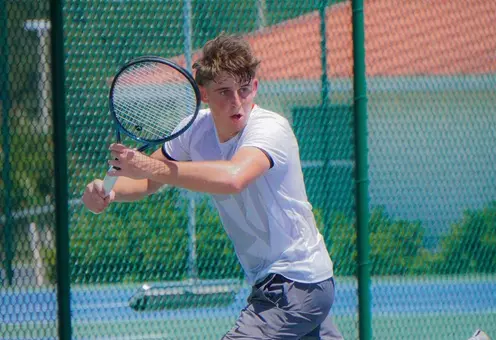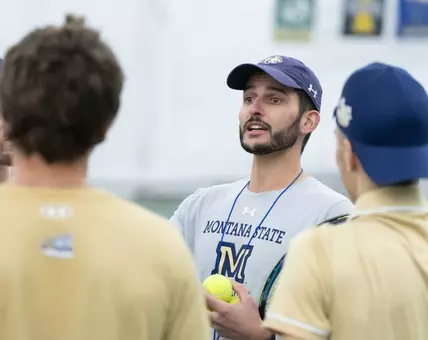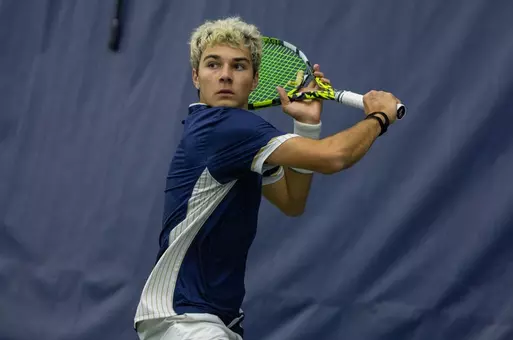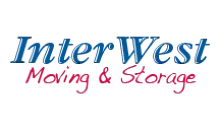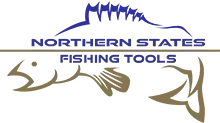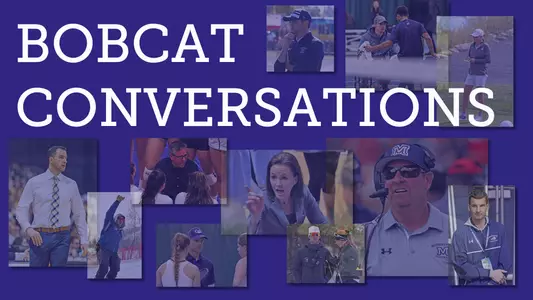
Montana State Men's Tennis Coach Trey Morris
4/7/2020 2:52:00 PM | Men's Tennis
MSU's interim men's tennis coach Trey Morris looks at his truncated first season at MSU
Trey Morris joined the Montana State men's tennis program early in the fall of 2020, and was immediately promoted to interim head coach. His young team showed individual improvement in the fall, then started the spring by winning five of its first nine matches. The team's season was cancelled just as conference play was heating up, but the Bobcats built a strong foundation for future success. Each of the team's top singles players were underclassmen in 2020.
How did you find your first experience of as a Division I head coach this season? "Being a head coach versus an assistant, there's obviously a learning curve there, it's a lot different, but I was surprised with how quickly the relationships with the (players) formed. (Becoming head coach) so early in the fall made the season that much easier, and the only learning curve from there was a couple of small things and we were good to go. Looking at the season, it was everything I expected, maybe a little more, and all positive things. I think we were trending toward having, or we had, a very successful season, a season that built upon itself. We started to build a strong foundation of who we are as a team, as a program, and who our guys are as individuals in the fall. As the season went on we started laying brick after brick and in the spring we started to see things really come together."
What did you learn about coaching in the last nine months? "First off, I feel that my experience coaching as an assistant and running an academy set me up very well for trying to help our players to make the jump to the professional level through our individual player development program. However, the biggest adjustment to the head coaching position isn't the X's and O's, it's the administrative side of things. Just getting used to that has been what I have learned the most."
How do you feel about your personal transition the southeastern and mid-Atlantic regions of the U.S. to Montana? "My personal transition has been great! It's something that my wife and I were both looking for, to move out west and move to the mountains, and I think we found the best possible place for that in Bozeman, Montana. The snow has been different. I experienced a little bit of snow in North Carolina at my alma mater (Appalachian State), but for my wife it was a pretty big adjustment, and she was pretty terrified to drive at first. For her, getting more comfortable driving and with everything has been an adjustment, but overall it has been fine and being part of the family at the University and in Bobcat Athletics has made it easy."
How have you found the process of recruiting to Montana State? "Coming in I had a very, very specific goal set for the type of players I wanted. I wanted guys who are very talented, guys who could push the program forward to new heights, but what I was looking for, honestly, was guys that had higher aspirations than playing college tennis. Once I jumped into recruiting, however, I was very delightfully surprised. Montana State University really recruits itself. When you look at what we have here to offer with our community (Bozeman), university, natural environment (mountains), and tennis program we really stand apart. I mean, I think every single player that has come on a visit here has been ready to commit by the time they left."
What observations do you have about youth and high school tennis in Montana and the Northwest and Rocky Mountain regions? "What you see in the Pac Northwest and the Inter-Mountain region is strong American kids that are coming up, especially in the class of 2021. There are some very strong players coming out of the Inter-Mountain region, and when you look at the Pac Northwest, that will always be a powerhouse area. We signed a young man that's sitting at No. 106 in his class right now (Jacob Huppin), a four-star recruit coming out of (Spokane, Washington). That goes to show the quality of the Pac Northwest and our influence in the region. I think a lot of talented young kids are coming up, and the quality of tennis in Bozeman is growing and I think we'll see some players coming out of our own backyard pretty soon."
How big a part of your plan for building this program is player development? "I think you look at the entire staff. You start with our base, the tennis staff, but we have quality staff throughout Bobcat Athletics program. You look at Brittney (Patera), our nutritionist, you look at Coach (John) Sauer, who does a phenomenal job in the strength and conditioning program, and you look at Aaron Grusonik (Director of Student-Athlete Wellness), who really helps us out on the mental side. You look at the resources available, and the facility where we train every single day on campus, those things are huge. I think that's what makes this such an attractive place and a place that we can develop players. Hopefully we have players that get here as freshmen who are ready to work and who want to be playing their best tennis their senior year and hopefully keep playing beyond that."
You had a young team in 2020, how good can this team be? "I think the sky's the limit with these guys, to be honest. We have a young team and we have a lot of talented guys coming in next fall, as well, in our first recruiting class. The goals we set as a staff are very high. I think obviously our goal is to win the Big Sky Conference with this group of guys, but more than that we want to get inside the top 50 nationally and push into the second round of the NCAA Tournament. That's not something that comes easily, however that's where we as a staff believe this program is heading."
What do you want to be the hallmarks of your program at MSU? "A couple things excite me the most about this program. The type of players that I get to work with every day and the motivation they have, and the community here, those things really push us forward. What I see at MSU is amazing support. We had an 8 am match on a Friday to open our home schedule and we had a great showing from the community. Continuing to grow that piece is something I'll be proud of, and turning this into something of a college tennis mecca in the sense of getting people excited, getting people out, continuing to grow the sport while having success on the court are things that are important."
What are you proud of about the 2019-20 team? "Coming into a program that you haven't been a part of as a head coach (in the summer) means that you inherit a lot of players, so that means there are a lot of unknowns, but I can say a lot of positive things about this group of guys. They really bought into what I was teaching, and it made the transition very easy. I can't say enough positive things about (the current team), whether it's their work ethic on the court, their willingness to try new things, their readiness and work ethic off the court, they make my life a lot easier when they get a 3.4 GPA in the fall. Those are the things I'm proud of and happy about, and they made the transition for me that much easier."
How would you describe your philosophy in building a program? "My philosophy is to focus very, very heavily on individual player development here at MSU. What that means is there is a lot of one-on-one training time. Because tennis is such an individual sport, we want to build that foundation for each player. Doing that will give us the best results as a team, and because that's something that's rare in college tennis, individual attention, individual player development, trying to send guys to the next level, I think that's something that sets us apart with the recruits we've signed. Getting the opportunity to train at the highest level with the resources we have is something we emphasize and something we work hard at. Going forward our goals as a staff, obviously, is to win conference and make the top 50 in the country and make a deep run in the NCAA, but it's also a goal to see each guy reach that top 600, 700 ranking in the world, that type of range. That's where we want to be. If we're helping players get to that level, the winning, the trophies, the team accomplishments will take care of themselves. One thing I try to do is to recruit as much local, American talent as I can. My goal is to definitely get to a place where we have a roster that is 70 percent Americans. I love international talent, attracting international kids that fit our program, is important, but we want to start as close to home as we can. That's the foundation of our program."
#GoCatsGo
How did you find your first experience of as a Division I head coach this season? "Being a head coach versus an assistant, there's obviously a learning curve there, it's a lot different, but I was surprised with how quickly the relationships with the (players) formed. (Becoming head coach) so early in the fall made the season that much easier, and the only learning curve from there was a couple of small things and we were good to go. Looking at the season, it was everything I expected, maybe a little more, and all positive things. I think we were trending toward having, or we had, a very successful season, a season that built upon itself. We started to build a strong foundation of who we are as a team, as a program, and who our guys are as individuals in the fall. As the season went on we started laying brick after brick and in the spring we started to see things really come together."
What did you learn about coaching in the last nine months? "First off, I feel that my experience coaching as an assistant and running an academy set me up very well for trying to help our players to make the jump to the professional level through our individual player development program. However, the biggest adjustment to the head coaching position isn't the X's and O's, it's the administrative side of things. Just getting used to that has been what I have learned the most."
How do you feel about your personal transition the southeastern and mid-Atlantic regions of the U.S. to Montana? "My personal transition has been great! It's something that my wife and I were both looking for, to move out west and move to the mountains, and I think we found the best possible place for that in Bozeman, Montana. The snow has been different. I experienced a little bit of snow in North Carolina at my alma mater (Appalachian State), but for my wife it was a pretty big adjustment, and she was pretty terrified to drive at first. For her, getting more comfortable driving and with everything has been an adjustment, but overall it has been fine and being part of the family at the University and in Bobcat Athletics has made it easy."
How have you found the process of recruiting to Montana State? "Coming in I had a very, very specific goal set for the type of players I wanted. I wanted guys who are very talented, guys who could push the program forward to new heights, but what I was looking for, honestly, was guys that had higher aspirations than playing college tennis. Once I jumped into recruiting, however, I was very delightfully surprised. Montana State University really recruits itself. When you look at what we have here to offer with our community (Bozeman), university, natural environment (mountains), and tennis program we really stand apart. I mean, I think every single player that has come on a visit here has been ready to commit by the time they left."
What observations do you have about youth and high school tennis in Montana and the Northwest and Rocky Mountain regions? "What you see in the Pac Northwest and the Inter-Mountain region is strong American kids that are coming up, especially in the class of 2021. There are some very strong players coming out of the Inter-Mountain region, and when you look at the Pac Northwest, that will always be a powerhouse area. We signed a young man that's sitting at No. 106 in his class right now (Jacob Huppin), a four-star recruit coming out of (Spokane, Washington). That goes to show the quality of the Pac Northwest and our influence in the region. I think a lot of talented young kids are coming up, and the quality of tennis in Bozeman is growing and I think we'll see some players coming out of our own backyard pretty soon."
How big a part of your plan for building this program is player development? "I think you look at the entire staff. You start with our base, the tennis staff, but we have quality staff throughout Bobcat Athletics program. You look at Brittney (Patera), our nutritionist, you look at Coach (John) Sauer, who does a phenomenal job in the strength and conditioning program, and you look at Aaron Grusonik (Director of Student-Athlete Wellness), who really helps us out on the mental side. You look at the resources available, and the facility where we train every single day on campus, those things are huge. I think that's what makes this such an attractive place and a place that we can develop players. Hopefully we have players that get here as freshmen who are ready to work and who want to be playing their best tennis their senior year and hopefully keep playing beyond that."
You had a young team in 2020, how good can this team be? "I think the sky's the limit with these guys, to be honest. We have a young team and we have a lot of talented guys coming in next fall, as well, in our first recruiting class. The goals we set as a staff are very high. I think obviously our goal is to win the Big Sky Conference with this group of guys, but more than that we want to get inside the top 50 nationally and push into the second round of the NCAA Tournament. That's not something that comes easily, however that's where we as a staff believe this program is heading."
What do you want to be the hallmarks of your program at MSU? "A couple things excite me the most about this program. The type of players that I get to work with every day and the motivation they have, and the community here, those things really push us forward. What I see at MSU is amazing support. We had an 8 am match on a Friday to open our home schedule and we had a great showing from the community. Continuing to grow that piece is something I'll be proud of, and turning this into something of a college tennis mecca in the sense of getting people excited, getting people out, continuing to grow the sport while having success on the court are things that are important."
What are you proud of about the 2019-20 team? "Coming into a program that you haven't been a part of as a head coach (in the summer) means that you inherit a lot of players, so that means there are a lot of unknowns, but I can say a lot of positive things about this group of guys. They really bought into what I was teaching, and it made the transition very easy. I can't say enough positive things about (the current team), whether it's their work ethic on the court, their willingness to try new things, their readiness and work ethic off the court, they make my life a lot easier when they get a 3.4 GPA in the fall. Those are the things I'm proud of and happy about, and they made the transition for me that much easier."
How would you describe your philosophy in building a program? "My philosophy is to focus very, very heavily on individual player development here at MSU. What that means is there is a lot of one-on-one training time. Because tennis is such an individual sport, we want to build that foundation for each player. Doing that will give us the best results as a team, and because that's something that's rare in college tennis, individual attention, individual player development, trying to send guys to the next level, I think that's something that sets us apart with the recruits we've signed. Getting the opportunity to train at the highest level with the resources we have is something we emphasize and something we work hard at. Going forward our goals as a staff, obviously, is to win conference and make the top 50 in the country and make a deep run in the NCAA, but it's also a goal to see each guy reach that top 600, 700 ranking in the world, that type of range. That's where we want to be. If we're helping players get to that level, the winning, the trophies, the team accomplishments will take care of themselves. One thing I try to do is to recruit as much local, American talent as I can. My goal is to definitely get to a place where we have a roster that is 70 percent Americans. I love international talent, attracting international kids that fit our program, is important, but we want to start as close to home as we can. That's the foundation of our program."
#GoCatsGo
2020 Hype Video
Thursday, February 13
Men's Tennis Preview | Sac St & Idaho St
Wednesday, April 05
AD Peter Fields and Coach Ash's Remarks Logo Press Conference Remarks
Wednesday, April 17
Cat Dancers - Feb. 24, 2013
Monday, March 25
